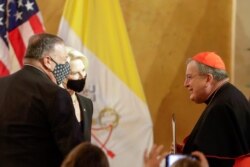U.S. Secretary of State Mike Pompeo is meeting with officials in Rome where he highlighted the plight of persecuted religious groups in China and called on the Holy See to reconsider renewing a deal with Beijing.
"Nowhere is religious freedom under assault more than it is inside of China today,” said Pompeo. "Nor, of course, have Catholics been spared this wave of repression.”
The secretary of state’s remarks came as the Vatican and China are negotiating the renewal of a controversial 2018 agreement on the nomination of bishops. The terms of that deal have never been publicly revealed, but they are believed to address who has the authority to name church bishops inside China.
In China, there are two separate Catholic churches. One is approved by the Beijing government, and the other is an unofficial, independent network of churches loyal to the Vatican.
Vatican officials have defended their intention to renew the accord, citing the need for a direct communication channel with Beijing.
'Earthly considerations'
In a speech noting that nation-states’ efforts to protect religious freedom are “constrained by the realities of world politics,” Pompeo seemed to appeal to the Vatican to reverse its plans to renew the deal.
“The church is in a different position. Earthly considerations shouldn’t discourage principled stances based on eternal truths,” the top U.S. diplomat said.
Pompeo spoke at a U.S. Embassy-hosted symposium on “Advancing and Defending International Religious Freedom through Diplomacy.” Holy See Secretary of State Cardinal Pietro Parolin and Holy See Secretary for Relations with States Archbishop Paul Gallagher also participated.
Outside observers said it was unclear how the deal preserves the Catholic Church’s authority to name its own bishops inside China, where the communist government closely monitors faith communities.
"The main concern of the secret deal is whether the church can be [a] true church in both its biblical teachings and its leadership, independent from the Chinese Communist Party’s control and manipulation,” said Bob Fu, founder of ChinaAid, a Texas-based nonprofit organization that provides assistance to persecuted groups and rights activists in China.
Fu told VOA that a renewal of the deal would make “the underground independent church and its members more perilous for CCP’s persecution.”
A report by U.S. State Department on international religious freedom cited the case of Father Paul Zhang Guangjun, a Catholic priest who refused to join the state-approved Chinese Catholic Patriotic Association (CCPA). Zhang was beaten and taken away by Chinese security agents in 2019. His whereabouts are still unknown.
Friction over Vatican deal
Pompeo expressed his disapproval of the deal, tweeting on September 19 that “The Vatican endangers its moral authority, should it renew the deal.”
Two years ago, the Holy See reached an agreement with the Chinese Communist Party, hoping to help China's Catholics. Yet the CCP’s abuse of the faithful has only gotten worse. The Vatican endangers its moral authority, should it renew the deal. https://t.co/fl0TEnYxKS
— Secretary Pompeo (@SecPompeo) September 19, 2020
Last week, senior Vatican officials who spoke on the condition of anonymity said the Holy See was taken aback by the comments by Pompeo, Reuters reported.
And China has defended its record on Catholicism.
“Catholicism in China has witnessed sound development,” Chinese Foreign Ministry spokesperson Wang Wenbin said on September 22. “The two sides will maintain close communication and consultation to continuously improve bilateral relations.”
In a recent article published by a conservative religious journal, First Things, Pompeo called out the Chinese Communist Party’s “increasingly aggressive atheism” while outlining the prosecution of believers.
Wednesday at the joint press conference with Italian Foreign Minister Luigi Di Maio, Pompeo defended his article, saying it was consistent with long-standing administration policy.
“I wrote that piece to honor the moral authority of the Catholic Church and its capacity to influence and make things better for people all across the world,” said Pompeo. “They have historically stood with oppressed peoples all around the world."
A senior State Department official confirmed the top U.S. diplomat was not scheduled to have an audience with Pope Francis during this visit.
Pompeo met with the pontiff last October.
The pope’s office reportedly told American diplomats he would not personally receive Pompeo because of concerns about being seen as influencing the November presidential election.






